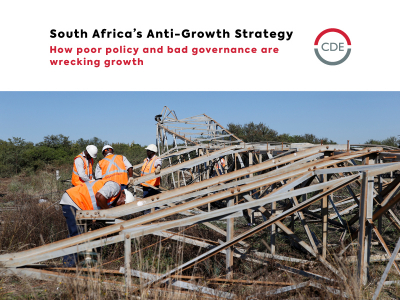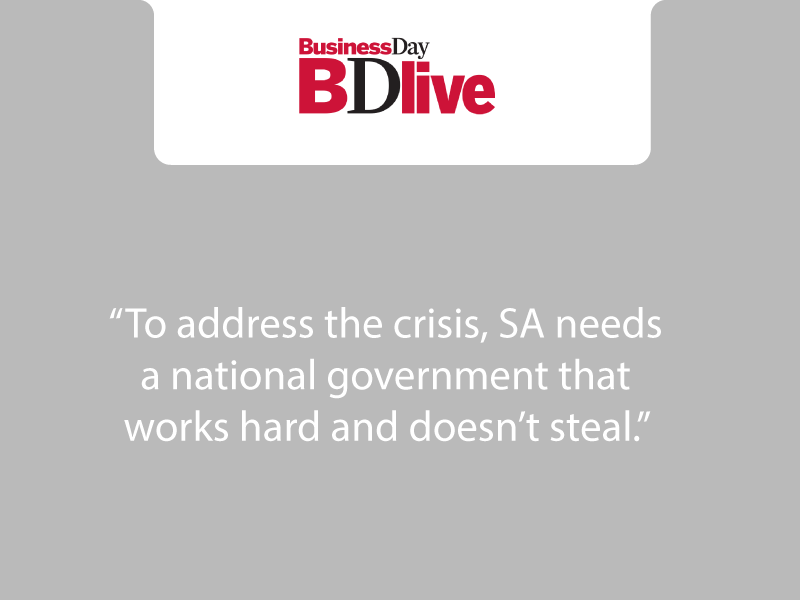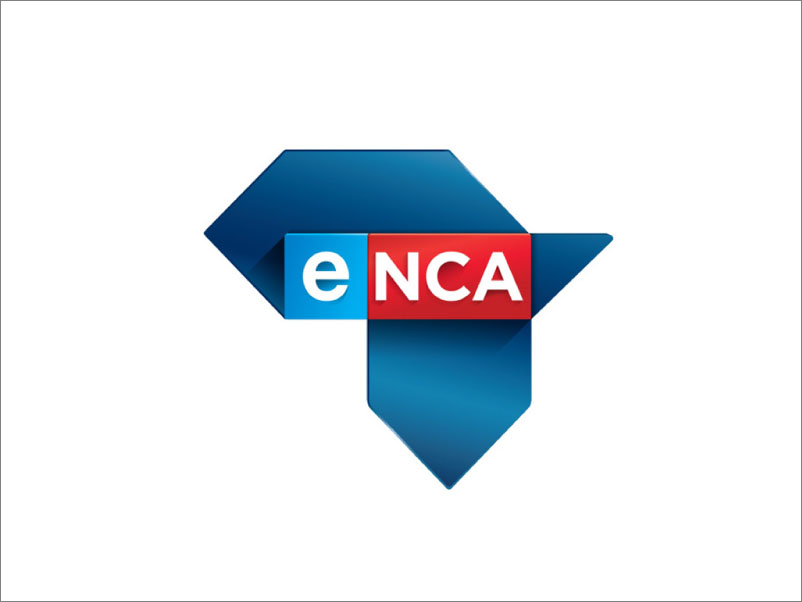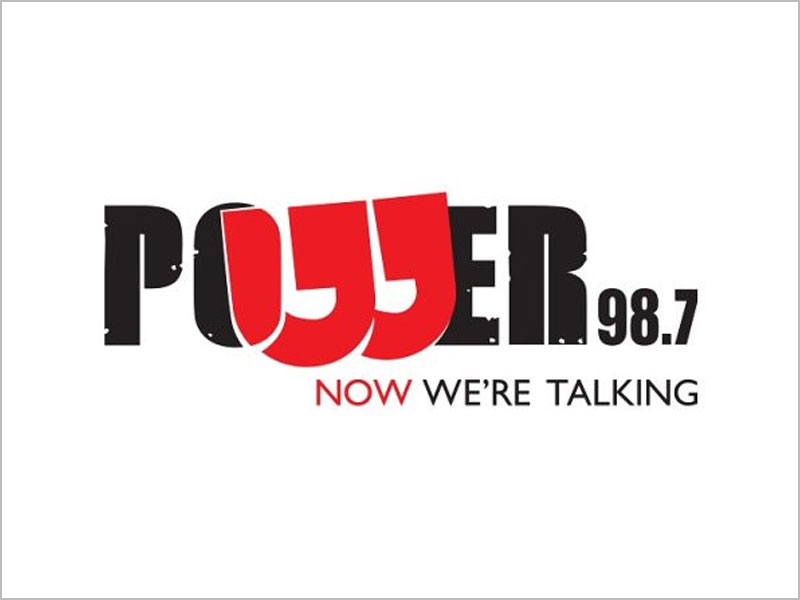
South Africa’s anti-growth strategy – a report released today by the Centre for Development and Enterprise (CDE) – argues that the slow economic growth of the last 15 years is the result of bad policy choices, a catastrophic decline in government performance and a devastating lack of leadership.
Ann Bernstein, executive director of CDE, said, “Despite rhetoric to the contrary, the South African government does not have a growth strategy. If anything, it has an anti-growth strategy.”
“South Africa has leaders who say they want growth, and there are a lot of government policy documents that describe how important growth is. However, at no stage has the country’s political leadership made a decisive choice to prioritise growth or put in place the components of sound policy and good governance essential to an effective growth strategy,” says Bernstein.
CDE has identified ten ways in which the government has wrecked South Africa’s growth prospects:
1. Poor policy and bad governance at Eskom: Inadequate energy supply is South Africa’s most critical constraint on growth. We do not have enough generating capacity to keep the economy running to its existing capacity. Maintaining Eskom’s monopoly has meant that its collapse through corruption, incompetence and cadre deployment has had catastrophic implications for the whole country.
2. Fiscal policy: Stated commitments to spending restraint and debt stabilisation have been violated in practice, whether in the form of excessive wage increases for the public sector or unfunded commitments to free higher education and expansion of social grants. As a result, public debt has increased nearly eight-fold from around R630 billion in 2007 to nearly R4.7 trillion in 2023. This has led to a steep rise in debt service costs, which absorb a rapidly rising share of tax revenues and diverts them from more productive uses.
3. Corruption: The Zondo Commission found that the state paid over R57 billion on corruption-tainted contracts to entities associated with the Guptas. Unfortunately, the extent that corruption has moderated under Cyril Ramaphosa is an open question. What is certain is that corruption and cadre deployment continues to take place, with a real risk of state capture 2.0 emerging in the future.
4. Crime and stability: South Africa’s criminal justice system has become less effective over the past decade. Murder – the category of crime best reported and recorded – has risen by almost 60 percent. The events of July 2021 have exposed the fragility of public order in South Africa, with huge implications for levels of confidence and investment, especially since no ringleaders have been brought to book.
5. Logistics and Transnet: Poor logistics systems mean higher costs for customers, inconvenience and a brake on SA exports. Transnet’s monopoly on port management and railway infrastructure explains why its services have declined and costs have risen – to the detriment of South African businesses, consumers and the economy as a whole.
6. Mining: Mining revenue is stagnating because of uncertainty about the future trajectory of tax policy, the level and rigidity of wages, and an empowerment model that has increased investment risk. Licensing delays have resulted in a slowdown in investment projects, while mismanagement of the sector overall has meant that South Africa is an increasingly undesirable destination for mining companies seeking to expand their output.
7. Decaying public infrastructure: There has been severe underinvestment in passenger rail, wastewater systems, roads, water infrastructure and state facilities such as schools, police stations, courtrooms, Home Affairs’ offices and hospitals. A key commonality underlying all of these trends is government’s cadre deployment strategy. This has seen the appointment of wholly unsuitable people into key organisations mandated to provide and maintain infrastructure, while also saddling them with an unconstitutional conflict of interest: it is impossible to serve the interests of the ANC and fulfil one’s fiduciary duties to the public organisations they head.
8. Local government: Only 41 of SA’s 257 municipalities received clean audits in 2020/21, while the Department of Cooperative Government and Traditional Affairs declared that 64 were “dysfunctional”. With respect to economic growth, one of the key effects of the declining quality of local infrastructure has been to raise the costs of doing business.
9. BBBEE and localisation: Two government policies aimed at economic transformation – broad-based black economic empowerment and industrialisation-through-localisation – have inhibited growth. Products designated for local procurement are generally more expensive or of a lower quality relative to possible imports (which is why local products are not chosen on their own merits), while BBBEE has raised the costs of doing business and introduced new uncertainties that affect investment plans.
10. Lack of leadership: President Ramaphosa, for all his eloquent rhetoric, has presided over a Cabinet full of mediocrities who are either incapable or unwilling to address the challenges they face in their portfolios. He has governed by establishing well-intended-but-ineffectual committees while leaving in place ministers who bend and break every prescript of the ministerial handbook and openly question his agenda.
The accumulated effect of each poor policy and each example of government failure now far exceeds the already-large sum of its individual parts.
According to Bernstein: “We have a state that is increasingly a brake on growth and unable to deliver on its most basic functions, presiding over deteriorating infrastructure and rapidly rising levels of indebtedness. It is a state in which the corrupt thrive at the expense of good managers, and where the lives of whistle-blowers are increasingly at risk.”
For media enquiries and interview requests, please contact Refiloe Benjamin: media@cde.org.za | 011 482 5140
ABOUT THIS REPORT
South Africa’s anti-growth strategy is the first of a two-part CDE series focusing on economic growth. The second report will identify key policy priorities to remove barriers that block growth.
To read the executive summary: click here.
ABOUT THE CENTRE FOR DEVELOPMENT AND ENTERPRISE
CDE is an independent policy research and advocacy organisation. It is South Africa’s leading development think tank, focusing on critical development issues and their relationship to economic growth and democratic consolidation. Through examining South African realities and international experience, coupled with high-level forums, workshops and roundtables, CDE formulates practical policy proposals outlining ways in which South Africa can tackle major social and economic challenges.




